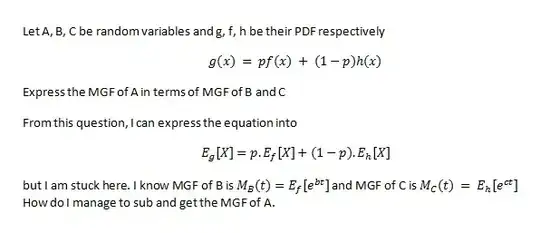
Please show some working when substituting the equation.

Please show some working when substituting the equation.
Actually, @DilipSarwate explained exactly how to do it in your previous question.
\begin{align} M_Z(t) &= E[e^{sZ}] \\ &= \int_{-\infty}^\infty e^{tz}\, f_Z(z) dz \\ &= \int_{-\infty}^\infty e^{tz}\, [pf_X(z)+(1-p)f_Y(z)] dz \end{align}
and then use basic properties of expectations / integrals